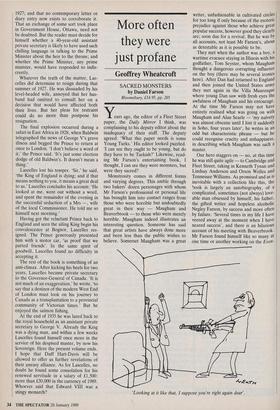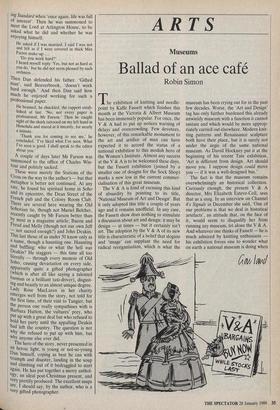More often they were just profane
Geoffrey Wheatcroft
SACRED MONSTERS by Daniel Farson
Bloomsbury, £14.95, pp. 205
Years ago, the editor of a Fleet Street paper, the Daily Mirror I think, was complaining to his deputy editor about the inadequacy of their staff. The deputy agreed: 'What this paper needs is some Young Turks.' His editor looked puzzled. `I can see they ought to be young, but do they have to be Turkish?' Likewise, read- ing Mr Farson's entertaining book, I thought, I can see they were monsters, but were they sacred?
Monstrosity comes in different forms and varying degrees. This amble through two bakers' dozen personages with whom Mr Farson's professional or personal life has brought him into contact ranges from those who were horrible but undoubtedly great in their way — Maugham and Beaverbrook — to those who were merely horrible. Maugham indeed illustrates an interesting question. Someone has said that great artists have always done more and been less than the public wishes to believe. Somerset Maugham was a great writer, unfashionable in cultivated circles for too long if only because of the esoteric prejudice against those who achieve great popular success, however good they clearly are; soon due for a revival. But he was by all accounts, not least Mr Farson's, about as detestable as it is possible to be. They met when the author was a boy, a wartime evacuee staying in Illinois with his godfather, Tom Seyster, whom Maugham thought a dangerous corrupting influence on the boy (there may be several ironies here). After Dan had returned to England and then joined the United States army they met again in the Villa Mauresque where young Dan saw with fresh eyes the awfulness of Maugham and his entourage. At the time Mr Farson may not have entirely realised what was going on with Maugham and Alan Searle — 'my naivety was almost obscene until I lost it suddenly in Soho, four years later', he writes in an odd but characteristic phrase — but he could recognise cruelty and unhappiness, in describing which Maugham was such a master.
Our hero staggers on — no, at this time he was still quite agile — to Cambridge and Fleet Street, taking in Kenneth Tynan and Lindsay Anderson and Orson Welles and Tennessee Williams. As promised and as is inevitable with a collection like this, the book is largely an autobiography, of a complicated, sometimes (not always) love- able man obsessed by himself, his father, the gifted writer and hopeless alcoholic Negley Farson, by success and more often by failure. 'Several times in my life I have veered away at the moment when I have neared success', and there is an hilarious account of his meeting with Beaverbrook. Mr Farson found himself like so many at one time or another working on the Even- 'Looking at it like that, I suppose you're right again dear'. ing Standard when 'once again, life was full of interest'. Then he was summoned to meet the Lord at Arlington House, to be asked what he did and whether he was enjoying himself.
He asked if I was married. I said I was not and felt as if I were covered in thick Max Factor make-up ... 'Do you work hard?' I heard myself reply 'Yes, but not as hard as you do,' but he did not seem pleased by such archness
Then Dan defended his father. 'Gifted man', said Beaverbrook , 'doesn't work hard enough.' And then Dan said how much he enjoyed working for such a professional paper.
He beamed, he chuckled, the rapport estab- lished at last. 'No, not every paper is professional, Mr Farson.' Then he caught sight of the shark tattooed on my left hand in Honolulu and stared at it intently, for nearly a minute.
'Thank you for coming to see me,' he concluded. 'I've liked what I've seen. What I've seen is good. I shall speak to the editor about you.'
A couple of days later Mr Farson was summoned to the office of Charles Win- tour and politely sacked. These were merely the Stations of the Cross on the way to the author's — but that metaphor is better not continued. At any rate, he found his spiritual home in Soho and its epicentre, the Dean Street of the French pub and the Colony Room Club. There are several here wearing the Old Sohovian tie, though not Muriel Belcher, recently caught by Mr Farson better than by most in a magazine article; Bacon and Freud and Melly (though not our own Jeff — not sacred enough?) and John Deakin. This last those of us under 50 know only as a name, though a haunting one. Haunting and baffling: who or what the hell was Deakin? He staggers — this time all too literally — through every memoir of Old Soho, causing devastation on every side, apparently quite a gifted photographer (which is after all like saying a talented barman or a brilliant taxi-driver), disgust- ing and beastly to an almost unique degree. Lady Rose MacLaren in her charity emerges well from the story, not told for the first time, of their visit to Tangier, but the person one really sympathises with is Barbara Hutton, the vultures' prey, who put up with a great deal but who refused to hold her party until the appalling Deakin had left the country. The question is not why she refused to put up with him, but why anyone else ever did. The hero of the story, never presented in an heroic light, is young or not-so-young Dan himself, coping as best he can with triumph and disaster, landing in the soup and climbing out of it bedraggled to start again. He has put together a merry anthol- ogy, an ideal post-Christmas present, and very prettily produced. The excellent snaps are, I should say, by the author, who is a very gifted photographer.


















































 Previous page
Previous page